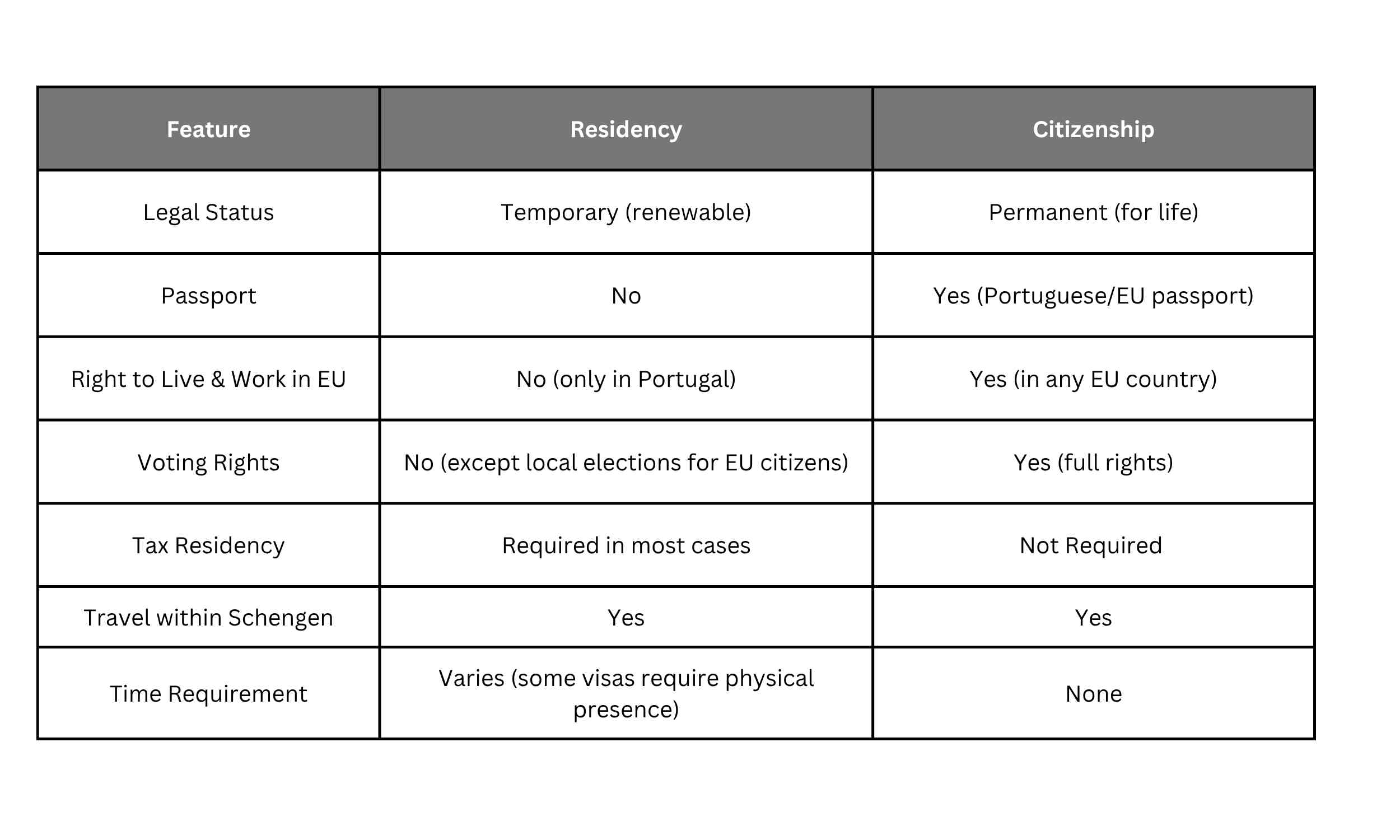Portugal has become one of the most sought-after destinations for expats, investors, and retirees looking for a high quality of life, a stable economy, and a gateway to Europe. Whether you’re considering moving to Portugal for work, investment, or lifestyle reasons, understanding the difference between residency and citizenship is essential for making an informed decision.
In this guide, we’ll break down the key differences between residency and citizenship in Portugal, their benefits, and how to determine which option best suits your needs.
Residency in Portugal
What Is Residency?
Residency in Portugal grants legal permission to live in the country for a specific period, with the option to renew. Residency does not grant full rights of citizenship, such as holding a Portuguese passport or voting in national elections.
Types of Residency Permits
Portugal offers several types of residency permits, including:
– Golden Visa – For investors who meet the minimum investment threshold.
– D7 Visa – For retirees and individuals with passive income.
– D8 Visa (Digital Nomad Visa) – For remote workers earning income from abroad.
– D2 Visa – For entrepreneurs and business owners.
– Work Visa – For individuals employed by a Portuguese company.
– Study Visa – For international students enrolled in Portuguese institutions.
Benefits of Portuguese Residency
– Live in Portugal legally with access to public healthcare and education.
– Visa-free travel within the Schengen Zone (26 European countries).
– Pathway to permanent residency or citizenship after five years.
– Flexibility – Some residency programs (such as the Golden Visa) require minimal physical presence.
Limitations of Residency
– Residency is temporary and must be renewed periodically.
– No right to a Portuguese passport unless citizenship is obtained.
– No voting rights in national elections (but EU citizens residing in Portugal can vote in local elections).
Citizenship in Portugal
What Is Citizenship?
Portuguese citizenship grants you full rights as a Portuguese national, including the right to hold a Portuguese passport, live and work anywhere in the European Union (EU), and vote in Portuguese elections.
Ways to Obtain Portuguese Citizenship
There are several ways to become a Portuguese citizen:
– Naturalization – After five years of legal residence in Portugal.
– Descent – If you have Portuguese parents or grandparents.
– Marriage or Civil Union – After three years of being married to a Portuguese citizen.
– Sephardic Jewish Ancestry – If you can prove Sephardic Jewish heritage.
– Exceptional Cases – Granted on a case-by-case basis for significant contributions to Portugal.
Benefits of Portuguese Citizenship
– Obtain a Portuguese (EU) passport, allowing visa-free travel to 190+ countries.
– Live, work, and study anywhere in the EU, EEA, and Switzerland.
– No need to renew residency permits.
– Full voting rights in Portugal.
– Pass citizenship to future generations.
Limitations of Citizenship
– More bureaucratic process compared to residency.
– Additional requirements such as a basic knowledge of the **Portuguese language (A2 level proficiency for naturalization).
– Potential tax implications depending on your personal situation.
Residency vs. Citizenship: Key Differences

Which One Is Right for You?
Choose Residency If:
– You want to live in Portugal temporarily or explore the country before committing.
– You plan to retire, work remotely, or invest in Portugal without needing a Portuguese passport.
– You want the benefits of Schengen travel and residency rights without the full obligations of citizenship.
Choose Citizenship If
– You plan to stay in Portugal long-term and want full rights as a Portuguese national.
– You want the freedom to live and work in any EU country.
– You need a stronger travel document (Portugal’s passport ranks among the most powerful worldwide).
– You are willing to meet the requirements, such as language proficiency and maintaining residency for at least five years.
Portugal offers flexible residency options for investors, retirees, remote workers, and professionals. If your goal is to enjoy Portugal’s lifestyle with minimal commitment, residency may be the ideal solution. However, if you seek greater rights, long-term stability, and EU-wide mobility, pursuing Portuguese citizenship is a worthwhile investment.
Whether you’re interested in obtaining residency or citizenship, our team at ORM is here to guide you through the process, ensuring a smooth transition to life in Portugal. Contact ORM today to explore your best options for living, working, and investing in Portugal!

